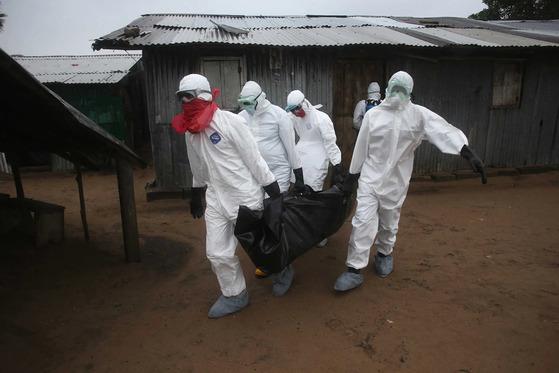Liberia: Gov’t Dispels ‘Ebola Outbreak’ Claims

A burial team from the Liberian health department prays before entering a house to remove the body of a woman suspected of dying of the Ebola virus on Aug. 14, 2014 in Monrovia. John Moore—Getty Images
— “The Ministry has an early warning surveillance system that can effectively detect suspected cases and report the same,” the Minister of Health, Dr. Jallah claimed.
The Ministry of Health has broken its silence to deny reports that the deadly Ebola virus, which wreaked havoc on the county years back, has emerged once again.
The Ministry, in a release noted that the report of such was not just a lie but a conspiracy theory designed to instill fear in people and cause confusion.
The Ebola virus, a biosafety level four pathogen, is an RNA virus discovered in 1976, and the outbreak in Liberia, Guinea, and Sierra Leone, resulted in the death of thousands of people from 2014 to 2015 when cases were active.
Dr. Wilhelmina Jallah, Liberia’s Minister of Health, laments the despicable motive of those disseminating such fabricated stories and warns of severe ramifications under the public health law of Liberia.
“Their motive is to cause panic amongst the general population,” Jallah said. There is absolutely NO outbreak of Ebola in Liberia at the moment.
“The Ministry has an early warning surveillance system that can effectively detect suspected cases and report the same. The public is urged to disregard the rumor and go about their normal business.”
The Ministry’s response comes just as reports emerged that the Ebola virus has hit Sinoe County, which is one of the hardest to reach and poorest counties in Liberia. The Daily Observer has however not been able to independently verify the claim, which surfaced on Facebook over the weekend.
The Ministry’s quick reaction, which is expected to be followed by a detailed press conference today, comes from the background of Ebola’s impact on the country from 2014 to 2015.
More than 11,000 in Liberia, Guinea, and Sierra Leone died from the virus, and above 28,000 people were affected. The first cases of the virus were reported in Liberia in March 2014, from Lofa County, and quickly spread among 15 political subdivisions.
It affected virtually every sector of the country and exposed its weak health systems, which collapsed under the pressure of the epidemic. This happens as Liberia also badly suffers from other deadly diseases, like malaria and tuberculosis, which were mostly ignored during the outbreak.
Apart from lives lost, the Liberian economy took a serious hit also, which took years for the country to come out.
In 2016, the World Health Organization (WHO) declared the Ebola epidemic ended — effectively putting an end to the world’s worst outbreak of the disease. The outbreak’s end left more than 17,000 Ebola survivors dealing with a wide range of complications and social stigma, including orphans with an uncertain future.
